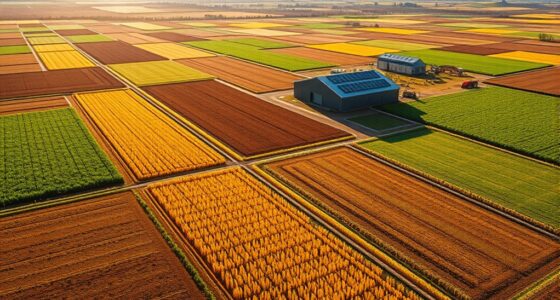Organic farming is all about growing food without synthetic chemicals or GMOs. You focus on natural methods that enhance soil health and promote biodiversity. By using techniques like crop rotation and natural fertilizers, you support healthier ecosystems. This approach not only improves food quality but also reduces harmful chemical exposure for you and the environment. Plus, organic certification under USDA standards guarantees that you're adhering to strict guidelines for safety and quality. If you're curious about its economic benefits and environmental impacts, there's plenty more to discover around why organic farming is gaining popularity.
Key Takeaways
- Organic farming prioritizes natural methods, avoiding synthetic chemicals and GMOs to enhance food quality and environmental health.
- It emphasizes soil health through practices like crop rotation and the use of natural fertilizers.
- Certified organic farming requires compliance with USDA standards, ensuring at least 95% organic ingredients in products.
- Organic practices promote biodiversity and reduce chemical runoff, benefiting ecosystems and water quality.
- Commitment to organic farming fosters sustainable practices, supporting long-term health for both people and the planet.
Definition and Principles of Organic Farming
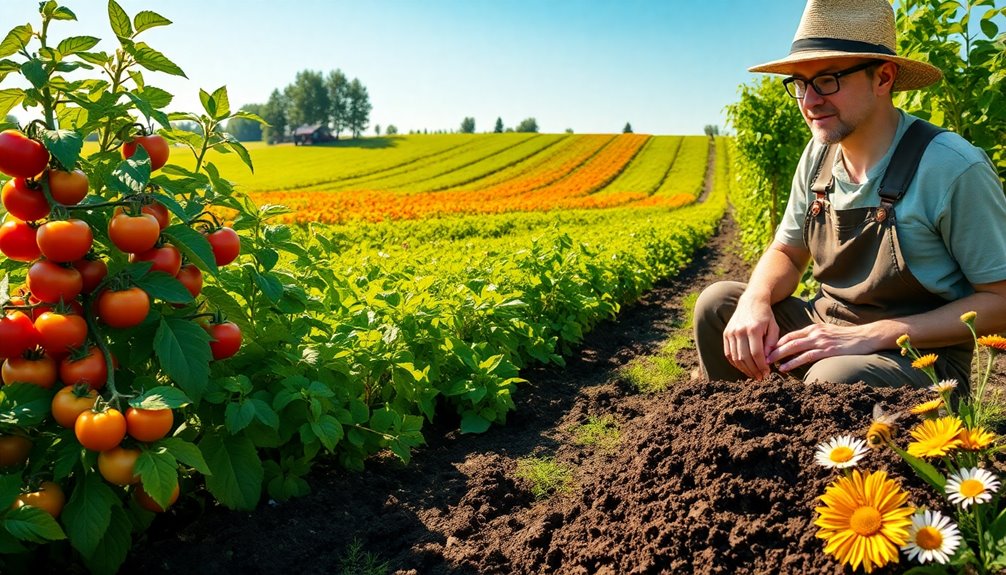
Organic farming is an agricultural approach that prioritizes natural methods over synthetic chemicals and genetically modified organisms (GMOs).
You'll find that organic farming emphasizes health, ecology, care, and fairness, aiming to produce food that benefits ecosystems, animal welfare, and human health.
By avoiding chemical inputs, organic practices enhance soil health through techniques like crop rotations and natural fertilizers. This not only reduces the need for harmful chemicals but also promotes biodiversity on your farm.
To achieve organic certification, you must comply with strict USDA standards, ensuring that at least 95% of your ingredients come from organic sources.
This certification process includes annual inspections to maintain the integrity of your organic practices, giving consumers confidence in the products they choose.
Historical Background of Organic Practices

The history of organic practices reveals a growing awareness of the need for sustainable farming methods. In the 1970s, concerns about the environmental and health impacts of synthetic fertilizers and pesticides prompted a shift towards organic farming.
The first Green Revolution, while increasing food production, caused significant ecological damage and health risks. To address these issues, the Organic Foods Production Act was enacted in 1990, establishing national standards and formalizing the certification process for organic agriculture.
Initially, organic certification was decentralized and unregulated, leading to the USDA's National Organic Program to guarantee consistency. Traditional techniques like crop rotation and composting have been integrated into modern organic standards, promoting sustainability and preserving the integrity of organic foods.
Certification Process for Organic Farms
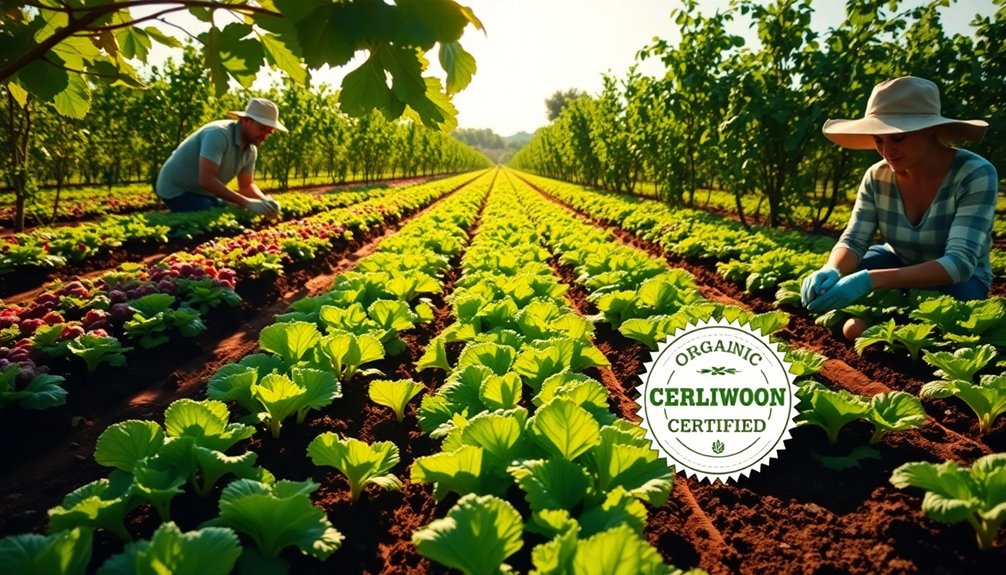
To get your organic farm certified, you'll need to follow the USDA's National Organic Program standards and submit an annual organic system plan.
Regular inspections by accredited certification bodies guarantee you meet these requirements.
Understanding the certification process, its frequency, and the benefits can help you navigate this essential step in organic farming.
Certification Requirements Overview
Frequently, farmers seeking organic certification must navigate a detailed process that guarantees their practices align with USDA standards.
To achieve certified organic status, you'll need to generate over $5,000 in annual revenue and submit an organic system plan outlining your farming practices and compliance with the National Organic Program (NOP).
This process prohibits the use of synthetic pesticides and fertilizers, ensuring your methods are truly organic. You must document all inputs, including seeds and pest control measures, and maintain records for at least three years for inspections and audits.
If you're converting from conventional to organic farming, be aware that this period takes a minimum of three years, during which you can't label your products as organic.
Inspection Frequency and Process
Annual inspections play an essential role in maintaining your organic certification and guaranteeing compliance with USDA Organic Standards. Each certified organic farm must undergo these inspections annually to verify adherence to organic practices.
During the inspection, you'll review your organic system plan, along with records of inputs and outputs. Inspectors may also conduct unannounced visits to uphold the integrity of the certification process.
They evaluate crucial factors such as soil health, pest management strategies, and crop rotation practices. It's important to maintain rigorous standards, as any non-compliance can lead to the suspension or revocation of your organic certification.
Benefits of Organic Certification
Organic certification offers numerous benefits for farmers, enhancing both marketability and sustainability. By adhering to USDA Organic Standards, you guarantee compliance with strict guidelines that prohibit synthetic pesticides and fertilizers.
This certification not only boosts your credibility among consumers but also opens up valuable market opportunities. When you obtain organic certification, you can access price premiums that increase your farm's profitability.
Additionally, regular onsite inspections maintain the integrity of organic labeling, fostering trust in your organic products. In the context of the growing demand for sustainable products in the tea industry, organic certification can significantly enhance your competitive edge in the market, particularly as consumers increasingly seek sustainable tea options.
While the annual certification fee and changeover costs can be intimidating for small-scale growers, many discover that the long-term economic sustainability gained through organic certification far outweighs these initial investments.
Embracing this path could transform your farming venture.
Economic Impacts of Organic Farming

When you consider the economic impacts of organic farming, you'll notice that shifting to organic methods can come with significant costs and challenges, like initial yield losses.
However, the growing market demand for organic products presents exciting opportunities, allowing you to potentially sell at higher prices.
Balancing these factors is key to maneuvering the financial landscape of organic agriculture.
Transition Costs and Challenges
Shifting to organic farming presents a farmer's unique set of economic challenges that can greatly impact their operations. Here are some key considerations:
- Initial yield losses: You may face a decline of 10-30% during the conversion period due to the removal of synthetic inputs.
- Conversion costs: The financial burden can escalate with organic certification fees exceeding $1,000 annually.
- Expensive organic inputs: Organic fertilizers and pest control measures often cost more than synthetic alternatives, straining economic viability.
- Limited access to price premiums: Non-certified growers can't tap into higher organic market prices, possibly leading to cash flow issues.
Despite these hurdles, long-term sustainability is achievable as organic farming can lead to greater market prices and consumer demand, offsetting initial conversion costs.
Market Demand and Opportunities
The growing demand for organic products presents exciting market opportunities for farmers looking to change their operations.
The U.S. organic food market reached $61.9 billion in 2020, highlighting strong consumer preference for organic goods. As an organic producer, you can benefit from price premiums that range from 20-100% higher than conventional items, enhancing your profitability.
While small-scale growers may face high certification costs and USDA standards, the expanding market access offers niche opportunities and community-supported agriculture (CSA) programs.
Although adapting to organic practices might lead to initial yield losses, improved soil health and resilience over time can result in long-term economic sustainability. Furthermore, such practices often align with the principles of personal development, which emphasize holistic approaches to well-being and sustainability.
Environmental Benefits of Organic Agriculture
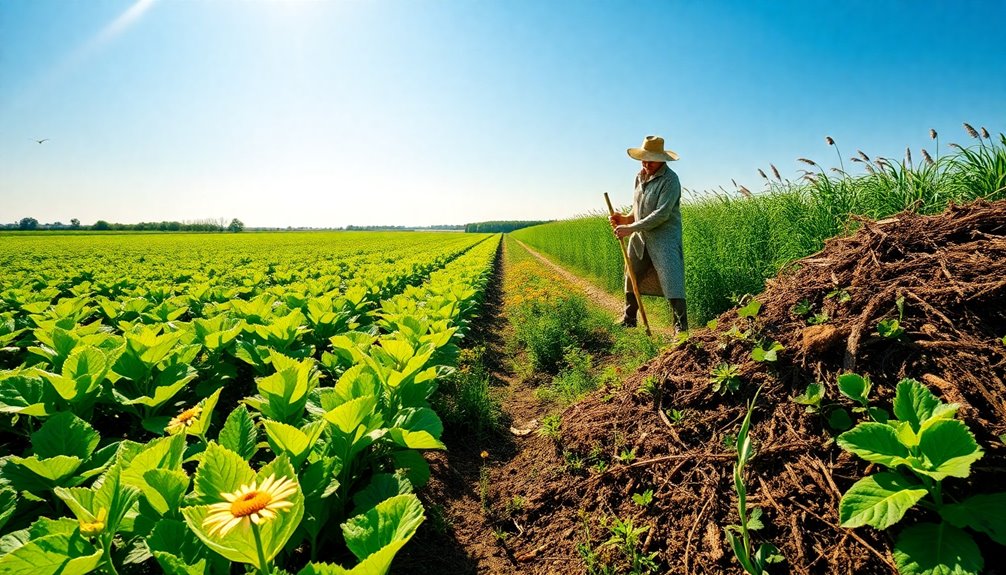
Organic agriculture offers a myriad of environmental benefits that greatly contribute to a healthier planet. Here are four key advantages:
- Enhanced Soil Health: Practices like composting and crop rotation improve soil organic matter and microbial activity, leading to better nutrient retention and reduced erosion.
- Reduced Greenhouse Gas Emissions: By avoiding synthetic fertilizers and pesticides, organic farming promotes a smaller carbon footprint, aiding in climate change mitigation.
- Increased Biodiversity: Techniques like no-till farming support various organisms, including beneficial insects and soil microorganisms, which enhance ecosystem health.
- Improved Water Quality: Organic practices minimize chemical runoff, reducing pollution in nearby water bodies and safeguarding aquatic ecosystems while improving water retention and reducing nitrate leaching.
Human Health and Organic Farming
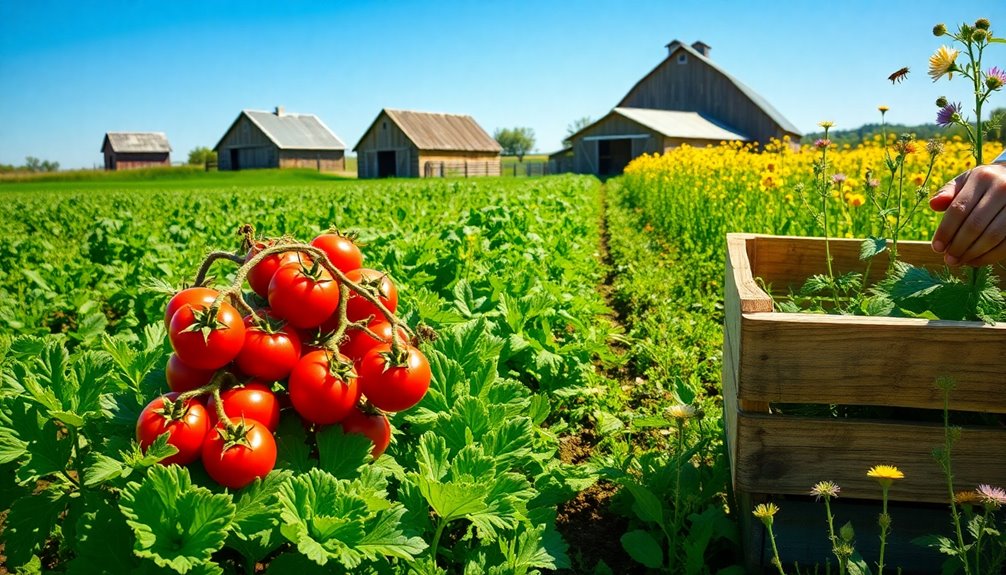
Health benefits play an essential role in the appeal of organic farming, as it effectively reduces your exposure to harmful chemicals found in conventional agriculture. By choosing organic production, you're not just opting for tastier food; you're prioritizing human health. Studies show that organic consumers have lower pesticide metabolites in their urine, indicating less exposure to toxic residues. Additionally, organic farming practices often promote gut microbiota health, which can lead to improved overall digestive wellness.
| Health Risk | Organic Farming Benefits | Conventional Farming Risks |
|---|---|---|
| Pesticide exposure | Reduced chemical residues | Chronic health conditions |
| Soil health | Nutrient-rich food | Depleted soil nutrients |
| Antibiotic resistance | Healthier livestock | Resistant bacteria |
| Chronic diseases | Overall enhanced well-being | Increased health risks |
This commitment to soil health and biodiversity leads to safer, more nutritious food for you and your family.
Biodiversity and Organic Methods

Many farmers are discovering that adopting organic methods greatly boosts biodiversity on their farms.
By implementing these strategies, you can enhance your ecosystem and improve your yields.
Here are four key benefits of organic farming:
- Crop Rotations: This practice replenishes soil health and promotes diverse microorganisms.
- Reduced Synthetic Chemicals: Fewer chemicals mean a safer environment for beneficial insects that control pests naturally.
- Diverse Planting Strategies: These strategies increase resilience against diseases and pests, reducing dependency on chemical interventions.
- Wildlife Habitats: Preserving habitats contributes to the conservation of various plant and animal species.
Additionally, engaging in practices such as forage quality testing can optimize the nutritional value of organic farming outputs.
Challenges Facing Organic Farmers
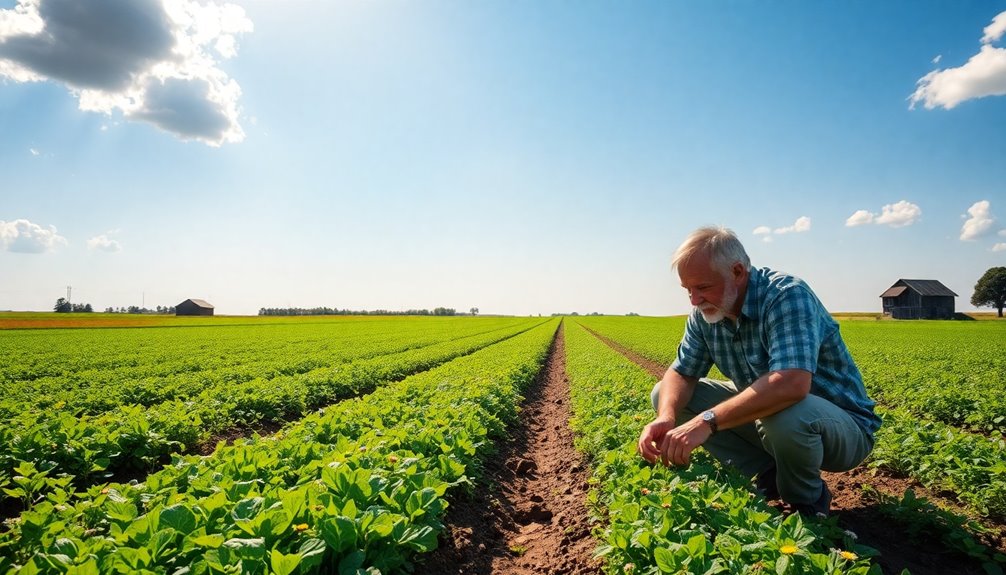
While pursuing organic farming offers numerous benefits, it also presents significant challenges that can deter prospective farmers. One major hurdle is the costly and time-consuming certification process, with annual fees and compliance requirements often overwhelming small-scale growers.
During the shift to organic production systems, you might face yield declines of up to 20%, making it tempting to abandon organic certification. Additionally, certified organic inputs can be pricier and less effective than synthetic options, impacting your profitability.
Market fluctuations also add economic uncertainty, complicating income stability. Furthermore, pest management in organic farming demands increased labor and intensive management practices, further straining your resources.
Steering through these challenges requires careful planning and commitment to succeed in organic farming.
Frequently Asked Questions
What Is the Difference Between Organic Farming and Chemical Farming?
When you compare organic farming and chemical farming, the differences are clear.
Organic farming avoids synthetic pesticides and fertilizers, relying instead on natural methods like composting and crop rotation. It emphasizes biodiversity and soil health.
In contrast, chemical farming uses man-made chemicals to boost yields, often harming the environment.
While organic practices may yield less initially, they promote long-term sustainability and ecological balance, making them a healthier choice for the planet.
What Are the 4 Principles of Organic Agriculture?
You might be surprised to learn that organic agriculture revolves around four key principles: health, ecology, care, and fairness.
The health principle encourages you to enhance the well-being of soil, plants, and animals, avoiding synthetic chemicals.
Ecology promotes biodiversity and natural pest control.
Care emphasizes responsible resource management for future generations, and fairness advocates for equitable relationships in the food system.
Together, these principles guide you toward sustainable farming practices that benefit everyone.
What Are 3 Organic Farming Practices?
You can adopt several organic farming practices to enhance soil health and reduce environmental impact.
First, try crop rotation to maintain soil fertility and disrupt pest cycles.
Next, use compost and animal manure as natural fertilizers to enrich your soil without chemicals.
Finally, implement natural pest control methods, like introducing beneficial insects, to manage pests effectively.
These practices not only promote sustainability but also create a healthier ecosystem for your crops.
Is Organic Chemical Free?
No, organic farming isn't completely chemical-free. While it avoids synthetic pesticides and fertilizers, it can use approved natural substances that are less harmful.
You'll find that organic farmers focus on practices like crop rotations and cover cropping to enhance soil health and manage pests naturally.
This approach reduces exposure to toxic chemicals, promoting a healthier environment and food options for you and your family.
Conclusion
In embracing organic farming, you're not just cultivating crops; you're nurturing health, preserving ecosystems, and fostering community. By choosing chemical-free agriculture, you're investing in sustainable practices, supporting biodiversity, and promoting a healthier future. As you explore organic methods, you're not only feeding your body but also nourishing the planet. The journey of organic farming invites you to think differently, act responsibly, and grow with purpose, ensuring that your choices today lead to a thriving world tomorrow.





